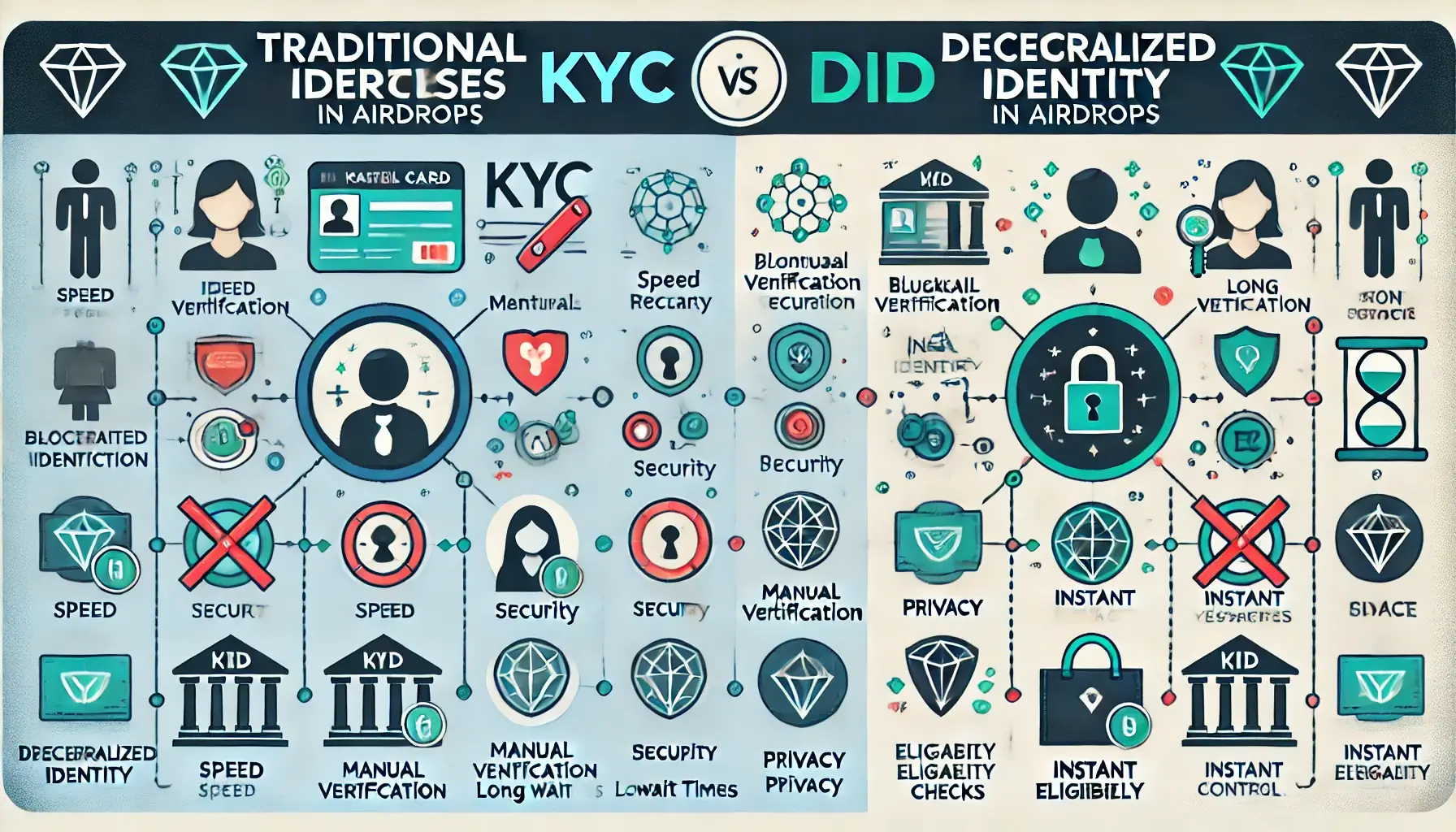Airdrops are a popular way for blockchain projects to distribute tokens, reward users, and build communities. However, traditional participation methods often require sharing personal data, creating privacy and security concerns for users. Decentralized identity solutions are emerging as a game-changer in the airdrop space, enabling secure and private participation while enhancing accessibility. This article explores how decentralized identity platforms are transforming airdrops and redefining user experiences in the crypto ecosystem.
1. The Privacy Problem in Traditional Airdrops
1.1 Why Privacy Matters in Airdrops
Traditional airdrops often require participants to complete Know Your Customer (KYC) processes. While these are intended to ensure compliance with regulations, they involve sharing sensitive personal information, such as passports or ID cards. This raises concerns about data breaches, identity theft, and unauthorized tracking.
For example, many participants hesitate to join airdrops hosted on centralized platforms due to fears of losing control over their personal data. This has created demand for a privacy-first approach in the crypto space, where users can retain control of their identities.
2. How Decentralized Identity Solutions Work
2.1 What Are Decentralized Identity Platforms?
Decentralized identity platforms, such as Polygon ID and Civic, enable users to prove their identities without sharing unnecessary personal information. These platforms use blockchain technology to issue verifiable credentials that are stored securely in a user-controlled wallet.
For instance, a user can prove they are eligible for an airdrop without revealing details like their name or address. This allows for secure and private participation while maintaining transparency for the project distributing the tokens.
2.2 Features of Decentralized Identity Platforms
- Self-Sovereign Identity (SSI): Users have full control over their data and can decide what to share and with whom.
- Zero-Knowledge Proofs (ZKPs): Prove eligibility for an airdrop without revealing personal details.
- Tamper-Proof Records: All data is stored on an immutable blockchain, ensuring accuracy and preventing fraud.
3. Enhancing Airdrop Participation with Decentralized Identity
3.1 Verifying Eligibility Without KYC
Decentralized identity platforms replace traditional KYC processes with anonymous verification systems. For example, a project can require participants to verify they are over 18 without asking for a scanned ID. This ensures compliance while protecting privacy.
3.2 Preventing Fraud and Duplicate Claims
One of the biggest challenges in airdrops is ensuring that participants cannot claim tokens multiple times using fake identities. Decentralized identity tools link eligibility to unique credentials, ensuring one claim per person without compromising privacy. For instance, BrightID is used by projects to ensure fair token distribution without requiring extensive documentation.
3.3 Global Accessibility
By removing the need for extensive KYC, decentralized identity platforms make airdrops accessible to users in regions with strict banking or identity regulations. This encourages global participation and fosters inclusion.

4. Examples of Projects Using Decentralized Identity in Airdrops
4.1 Polygon ID
Polygon ID has enabled projects on its blockchain to host privacy-focused airdrops. By leveraging zero-knowledge proofs, users can verify their eligibility without disclosing personal data, making the process seamless and secure.
4.2 Civic Airdrop Tools
Civic provides blockchain-based identity verification solutions that are widely used for secure airdrop campaigns. With Civic, projects can screen participants for eligibility while respecting their privacy.
4.3 Proof of Humanity for Universal Basic Income (UBI)
The Proof of Humanity protocol is used to verify real users for UBI airdrops on Ethereum. By combining decentralized identity verification with blockchain technology, the protocol ensures fair and transparent token distribution.
5. Challenges and Solutions in Adopting Decentralized Identity for Airdrops
5.1 Scalability Issues
Large-scale airdrops require robust systems to handle millions of verifications. Solution: Projects like Polygon ID are scaling their infrastructure to support high volumes without delays.
5.2 User Adoption
Many users are unfamiliar with decentralized identity platforms, which can limit participation. Solution: Simplified onboarding processes and educational campaigns are helping users adopt these tools.
5.3 Regulatory Compliance
While decentralized identity platforms prioritize privacy, projects must still comply with regional regulations. Solution: Platforms integrate features like proof of residency without exposing sensitive details.
6. The Future of Decentralized Identity in Airdrops
As the cryptocurrency space grows, decentralized identity solutions will become essential for airdrop campaigns. Here’s what the future holds:
- Wider Integration: More projects will adopt platforms like Civic, BrightID, and Polygon ID to enhance security and privacy.
- Advanced Verification Methods: Features like biometric authentication and dynamic eligibility checks will streamline participation.
- Cross-Chain Identity Solutions: Tools enabling identity verification across multiple blockchains will simplify participation in cross-chain airdrops.
Decentralized identity platforms are not just improving airdrops—they’re setting new standards for privacy, security, and accessibility in the blockchain ecosystem.
Conclusion
The integration of airdrops and decentralized identity solutions is revolutionizing how tokens are distributed, ensuring secure and private participation for users. By leveraging tools like Polygon ID and Civic, blockchain projects can maintain regulatory compliance while respecting user privacy. This shift is fostering trust, inclusivity, and long-term growth in the crypto space.
For users, decentralized identity platforms provide a way to participate in airdrops without compromising their personal information. As these solutions evolve, they will continue to empower users and projects alike, driving innovation in token distribution and governance.
For more insights and detailed guides on blockchain applications, visit our Blockchain Technology Guides.
Stay Updated
For the latest updates on decentralized identity platforms and airdrop strategies, follow us on:
Stay informed with the latest crypto trends at FreeCoins24.io.
Special Offer
Looking to trade your airdrop rewards? Sign up on Bybit today and receive up to $30,000 in deposit bonuses. Explore top trading opportunities with confidence.

















